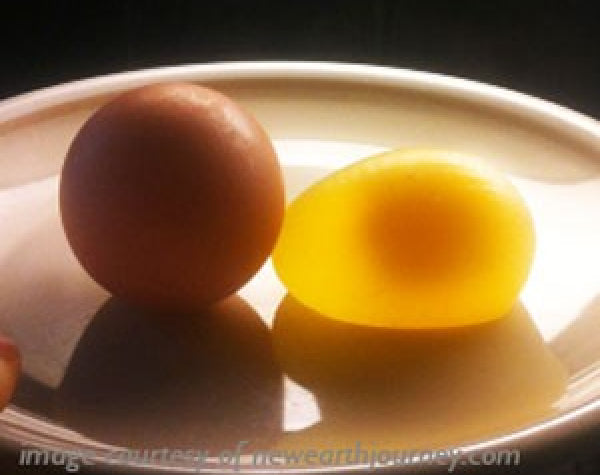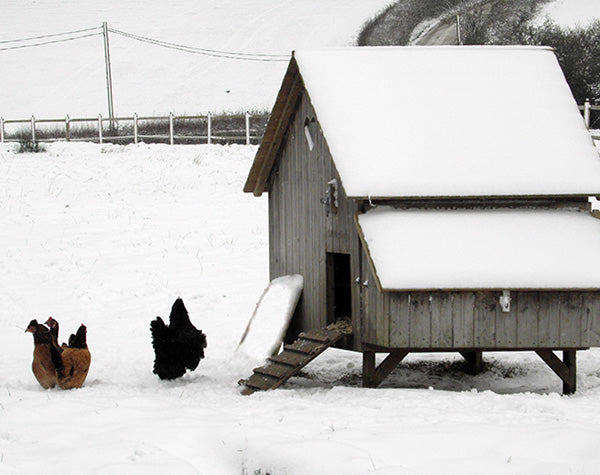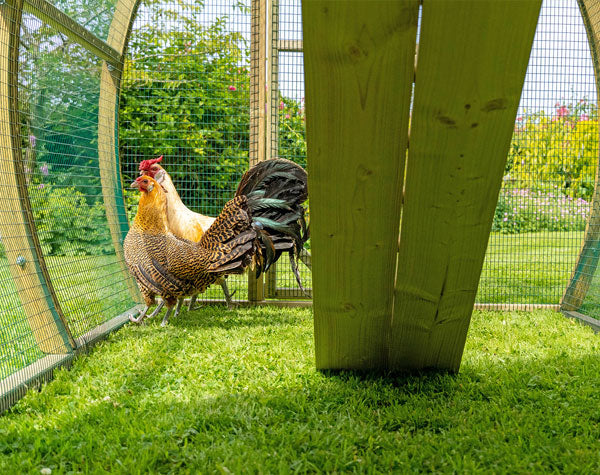Solving Eggshell Problems in Chickens
Introduction
Keeping chickens can be incredibly rewarding, especially when you start collecting fresh eggs each morning. Chickens are wonderful to have around, from their aloof stares to their strutting teenager-esque walk just begging you to try to tell them what to do.

On top of their quirky characters, the biggest advantage of keeping chickens is ... eggs! And when you have a surfeit of eggs in the Spring and Summer, you need a good egg recipe book on hand ... but be prepared to buy eggs from the supermarket during their moult!
Eggs that are fresher than fresh, with yolks as yellow as the morning sun and whites as pure as the driven snow (sorry, am I waxing too lyrical!).
But what happens when the eggs your hens lay are not quite right? From soft shells to strange shapes, understanding these issues can help ensure your chickens stay healthy and productive.
In this guide, we’ll explore common eggshell problems in hens, their causes, and how to fix them. Let’s look at the most common issues you might encounter and how to address them.
Soft-shelled and Shell-less Eggs

You may come across a ‘floppy egg’ in the nest box with just a membrane, but don’t worry, soft-shelled or shell-less eggs can be a normal part of a young hen’s early laying days or an older hen winding down her laying career.
However, if your middle-aged hens lay misshapen eggs, it could be a sign of calcium deficiency, poor diet, or other issues.
What Causes Soft-shelled Eggs?
Age Factors: Young hens starting to lay eggs have much to get used to physically, or it could be older hens nearing the end of their laying cycle.
Biological problems: As the egg forms and travels down the oviduct, the hen's body could simply have ‘forgotten’ to add the shell (see How an Egg is Made). This can often be a temporary blip caused by, for example, shock or stress and will return to normal a day or so later. More rarely, it can be that they physiologically cannot form the shell or a proper egg and, simply put, there is nothing you can do for that.
Lack of Daylight: If the birds are not getting enough daylight in their run, it prevents them from absorbing the calcium their bodies need to make good shells. Daylight is crucial for the quality of egg shells because, like humans, hens get vitamin D from sunlight or their diet.
Hens require at least 10 hours of daylight to metabolise calcium properly. Longer summer days naturally boost egg production, while shorter winter days can reduce it, which makes vitamin D-rich feeds or supplements a helpful option.
Calcium Deficiency: Insufficient calcium can lead to hens producing weak eggshells or even no shells at all. When this happens, they 'rob' their skeletons of calcium.

A 2004 study by Dr. Bruce Webster (renowned Avian Welfare scientist), and published in Poultry Science, explains that hens will compromise their bone strength to maintain eggshell quality when faced with calcium deficiency.
This is often found in commercial cage or battery hens (image right of a very weak rescue hen). As a result, their bones weaken, so providing a calcium-rich diet is important for protecting their bones too.
How to Fix Soft-Shelled Eggs

Give Calcium Supplements: Consider supplements like Flyte so Fancy Cal-Boost Poultry Calcium Liquid, or Enhance Shell & Bone Tonic, which include Vitamin D3 for better calcium absorption.
Ensure your hens have ad-lib access to Oystershell Grit, or add a Mineral Boost Powder to their feed to strengthen eggshells.
Boosting Natural Daylight: Consider whether your birds are getting the maximum amount of good daylight. especially if they are confined in a chicken run with a dark roof. Although giving them protection from predators and often the weather too, taking away daylight may not be the best for their overall health. See more below about types of chicken runs and letting the light in.

Improve Diet: Make sure you are feeding high-quality Poultry Layers Pellets that are specifically made for laying hens, as this will usually contain enough daily dietary calcium. Giving them too many treats can stop them from eating their staple diet and therefore reduce calcium intake.
Other Common Egg Abnormalities
Thick-Banded Shells and Weird Egg Shapes

Thick bands of shell on the egg are quite common and occur when an egg gets temporarily stuck in the hen’s oviduct, causing an extra layer of calcium to form around the shell.
It could be caused by shock at a crucial point in formation, or sometimes just old age. After all, when you've been laying an egg a day for a few years, 'things' get stretched and tired. These eggs are safe to eat but should not be used for hatching.
Wind Eggs or ‘Cock’ Eggs
These are very small eggs with no yolk, usually produced by young hens that are getting used to laying or, occasionally, when moulting hens come back into lay. It is generally not a concern, and they will become a normal size soon.
If you wish to read more about how many eggs a hen can lay in a day, and which breeds lay the most eggs, see our blog on How Many Eggs Does a Hen Lay.
Why are my Hens not laying at all?
If your hens have stopped laying entirely, consider the following:
Age: Hens over a certain age naturally slow down in egg production. For example, a Hybrid Laying Hen will start to reduce laying frequency from about 2 years old, and a Pure Breed hen possibly from 3 years old.

Daylight: Hens need around 10-12 hours of good daylight to lay regularly.
Ensure your Chicken Run or Pen has enough daylight, especially during shorter winter days.
If the run has a solid, dark roof on it, causing your hens to be in deep shade all day, this might have enough effect to stop them laying. A translucent roof covering like the one shown here is ideal.
Diet: Nutrition plays a big role in egg production. If a hen is fed too many - or excessive amounts of - treats, greenery, or a high protein feed, the bird can quickly become obese and stop laying. For more details about an optimum diet, read: What I Should and Shouldn't Feed My Chickens.

Egg eating: This is sometimes a reason for the lack of eggs, but this subject is worthy of an AskPhill Video all of its own.
Laying Elsewhere: If your hens are free-range, have you considered that they may just be laying elsewhere, like under a hedge or cosy corner of the garden?
For more on nature’s little miracle, the egg, and the complexity of how an egg is formed, visit our blog How a Hen Makes an Egg & The Anatomy of an Egg.
Disease and Egg Production
Certain illnesses, such as infectious bronchitis, can affect egg production and lead to eggshell problems. Look for other symptoms and consider a visit to a Vet if unsure, as it may need an antibiotic treatment for infections.
Remember: Always avoid using eggs from infected hens for breeding to prevent the spread of disease.
Is your Hen a Hen?
Laying hens have been known to gender-change or, more likely, you have been mis-sold. Through breeder's ignorance, poor sexing or deception, it's possible you may have been given or sold a cockerel by mistake, therefore ... no eggs.
Proper Egg Washing and Handling

Keeping your eggs clean starts with a clean coop and nesting box, but if you must clean them, knowing how to wash eggs properly is also important to prevent bacteria from entering through the porous shell.
We advise a deep 8cm layer of soft, super absorbent bedding like Chopped Hemp for the nest boxes and, with regular poop picking, it should always give you clean eggs.
To ensure you kill off any bacteria or germs on the shell, using a proper egg-washing liquid will get the job done. We recommend a sanitiser like Net-Tex Sanitiser & Egg Wash for effective cleaning.
Important: Never soak fresh eggs in plain water, as this can allow bacteria to penetrate the shell.
If you are planning on incubating eggs for hatching, then sanitising the egg shells is important, as well as thoroughly sterilising the incubator. Chicks hatched from unsterilised shells tend to be sickly and not live as long.
DEFRA's Egg Selling guidelines will not apply to many of us with only a few hens in our back gardens, but if garden-gate-selling, how you can classify them and whether you can call them free-range is useful information to know.
If retailing your eggs, Egg Marketing legislation does not allow for Class A eggs to be washed. We understand the feeling behind it is that eggs of this grade and quality should be clean enough already. Class B eggs and those used for processing are ok to be washed.
Conclusion
Eggshell issues in laying hens can often be corrected by reviewing diet, age, health, and proper care, and are not necessarily something to worry about. However, if you are unsure about consuming them, simply throw them away.
By understanding the causes and solutions, you can ensure your hens stay healthy and continue to provide you with fresh, high-quality eggs.
Further Reading
How is a Hen's Egg Made - The Formation & Anatomy of an Egg
What You Should and Shouldn't Feed to Your Chickens - What Should I Avoid Feeding to My Chickens?
What are the Best Laying Hens - How Many Eggs Can a Hen Lay?
Beginner's Guide to Chicken Keeping is also a good read and covers all the basics you need to know
You can also watch our AskPhill Video about - The Worry of Odd Shaped Eggs



